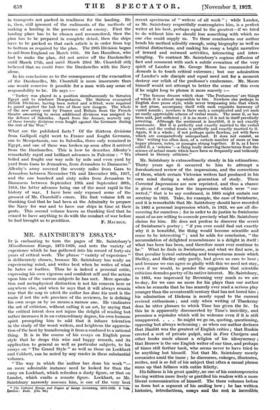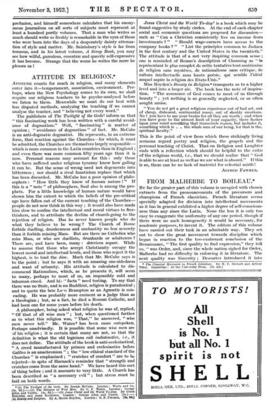MR. SAINTSBURY'S ESSAYS.*
IT -is enchanting to turn the pages of Mr. Saintsbury's Miscellaneous Essays, 1875-1920, and note the variety of experience which he has gathered into his record of forty-six years of critical work. The phrase "variety of experience" is deliberately chosen, because Mr. Saintsbury has really an experiencing mind, and writes best when he writes of what he hates or loathes. Thus he is indeed a personal critic, expressing his own vigorous and confident self and the action upon him of the various subjects he has met. Mere specula- tion and metaphysical distinction is not his concern here or anywhere else, and when he says that it will always remain true that the way in which the author has done his work is the main if not the sole province of the reviewer, he is defining his own scope as by no means a narrow one. He vindicates the art of criticism, without calling it an art, by saying that the critical intent does not injure the delight of reading but rather increases it in an extraordinary degree, his own humane spirit prompting him to add that it infuses toleration in the study of the worst writers, and heightens the apprecia- tion of the best by transforming it from a confused to a rational thing. It is in the course of his essays on English prose style that he drops this wise and happy remark, and its application to general as well as particular subjects, to his essays on "The Grand Style" as well as those on Lockhart and Cobbett, can be noted by any reader in these substantial volumes.
"The way in which the author has done his work "- no more admirable instance need be looked for than the essay on Lockhart, which refreshes a dusty figure, or that on Landor, which exalts a remote figure. Lockhart, as Mr. Saintsbury narrowly assesses him, is one of the very best
• The Coaseted Essays and Papers of George Sairdsbury, 1875-1920. 8 Vols, London: Dent, DM. Odd recent specimens of "writers of all work " ; while Landor, as Mr. Saintsbury respectfully contemplates him, is a perfect writer at his best, perhaps equal to the greatest—if we tried to do without him we should lose something with which no one else could supply us. To these conclusions our author bends his method adroitly enough, using biography as well as critical distinctions, and 'making his essay a bright narrative of inward and outward activities, interacting and inter- mingling. To contrast Mr. Saintsbury's copious diffusion of fact and comment with such a subtle evocation of the very spirit of Landor as Mr. George Moore has commanded in Avowals is to touch critical extremes ; but our admiration of Landor's sole disciple and equal need not for a moment destroy our relish of the professor's exuberance. Mr. Moore himself would not attempt to better the sense of this even if he might long to phrase it more suavely :— " The famous dreams which close 'The Pentameron ' are things of which it is almost impossible to tire. Nowhere else perhaps in English does prose style, while never trespassing into that which is not prose, accompany itself with such exquisite harmony of varied sounds ; nowhere is there such a complicated and yet such an easily appreciable scheme of verbal music. The sense is, as has been said, Just sufficient ; it is no more ; it is not in itself peculiarly arresting. Although the sentiment is heartfelt, it is not exactly passionate. But it is perfectly and exactly married to the verbal music, and the verbal music is perfectly and exactly married to it. Again, it is a whole ; if not perhaps quite flawless, yet with flaws which are comparatively unimportant. It does not consist, as ' fine ' writing too often does, of a certain number of more or less happy phrases, notes, or passages strung together. It is, as I have called it, a 'scheme '—a thing really deserving those terms from the science of actual music which have been so frequently and tediously abused in literary criticism."
Mr. Saintsbury is extraordinarily steady in his estimations. Thirty years ago it occurred to him to attempt a foreshortened review of the impressions, and the corrections of them, which certain Victorian writers had produced in his own mind during a whole generation of study. These Corrected Impressions are now reprinted, and thus a chance is given of seeing how the impressions which were "cor- rected," that is to say confirmed, in 1895 might sustain our scrutiny in 1923. Take, for example, the case of Swinburne, and it is remarkable that Mr. Saintsbury should have recorded in 1895 a personal impression which, in 1923, we are all dis- covering for ourselves ; for in order to do justice to Swinburne most of us are willing to concede precisely what Mr. Saintsbury
claims for him. He does not profess to discover the secret of Swinburne's poetry ; "if you ever could find out exactly why it is beautiful, the thing would become scientific and cease to be interesting " ; and he adds for conclusion, "the accumulation of delighted remembrance is a delight in itself : what has been has been, and therefore must ever continue to be." What he finds in. Swinburne, and what we find now, is that peculiar lyrical outrushing and tempestuous music which. Shelley, and Shelley only partly, had given us ears to hear ; and because we can agree so gladly with this we need not stay, even if we would, to ponder the suggestion that scientific criticism denudes poetry of its native interest. Mr. Saintsbury, in 1895, was impressed by Browning very much as we are to-day, for we care no more for his plays than our author when he remarks that he has scarcely ever read a serious play younger than the seventeent.licentury that has not bored hum; his admiration of Dickens is nearly equal to the current revived enthusiasm ; and only when writing of Thackeray does he utter phrases to which Time has given the lie. In this he is apparently disconcerted by Time's incivility, and promises a rejoinder which will be welcome even if it is still unapproved. . . . So might we go on, quoting, questioning,
opposing but always welcoming ; as when our author declares that Hazlitt was the greatest of English critics ; that Ruskin erected a sort of private pulpit, and in Fors Clavigera and other books made almost a religion of his idiosyncrasy ; that Borrow is the one English writer of our time, and perhaps of times still farther back, who seems never to have tried to be anything but himself. Not that Mr. Saintsbury merely coruscates amid the inane ; he discourses, enlarges, illustrates, recites, and is so full of his subject that often a casual phrase sums up that fullness with entire felicity.
His fullness is his great quality, no one of his contemporaries having written more freely or gratified his readers with a more liberal communication of himself. The three volumes before us form but a segment of his smiling bow ; he has written histories, introductions, essays and the rest in incredible,
profusion, and himself somewhere calculates that his anony- mous journalism on all sorts of subjects must represent at least a hundred portly volumes. That a man who writes so much should write so freshly is remarkable in the eyes of those who were born into the days of a desperately dainty attenua- tion of style and matter. Mr. Saintsbury's style is far from tenuous, and in his latest volume, A Scrap Book, you may see how wilful, garrulous, eccentric and queerly self-expressive it has become. Strange that the worse he writes the more he pleases us I



























































 Previous page
Previous page